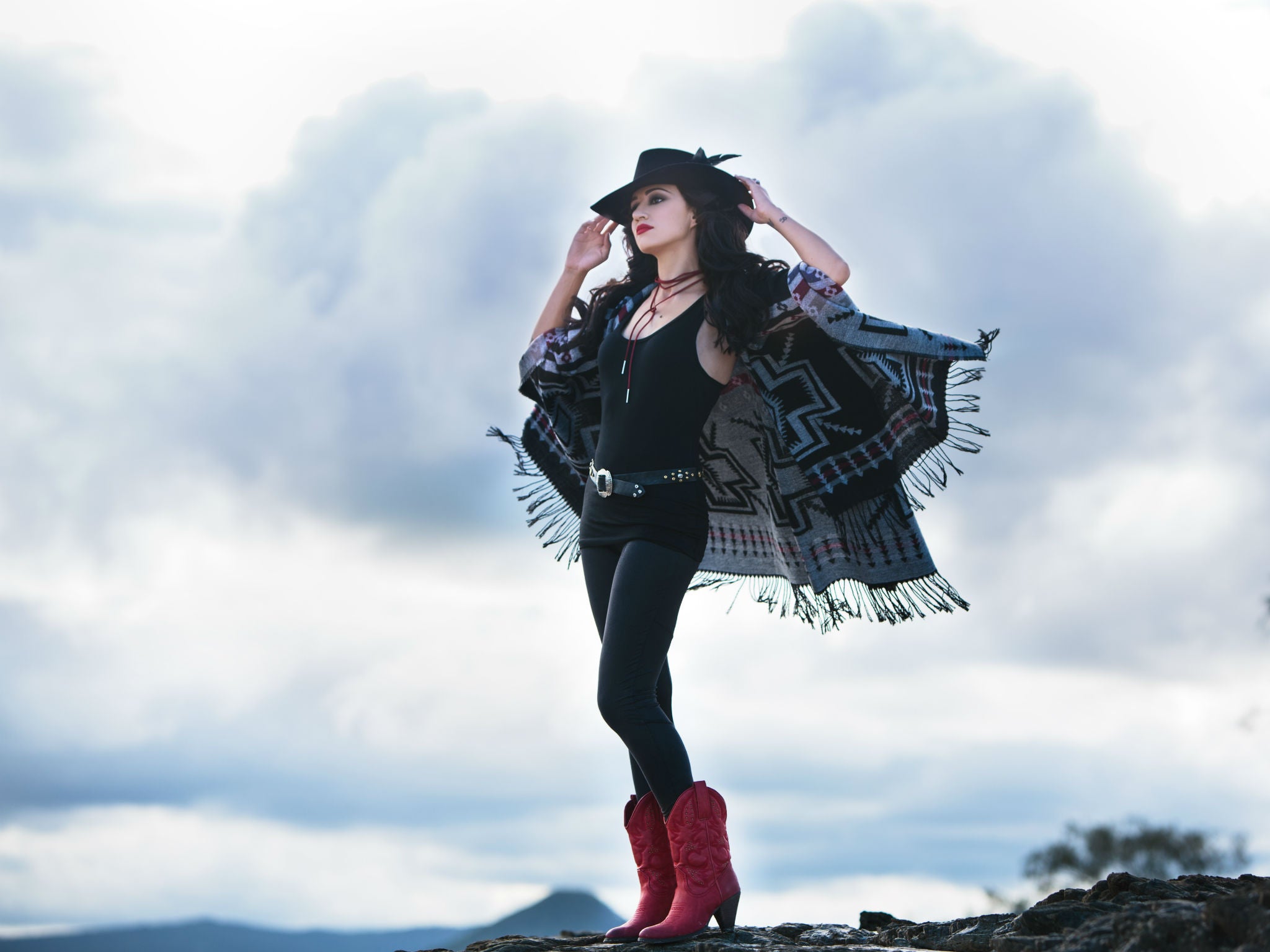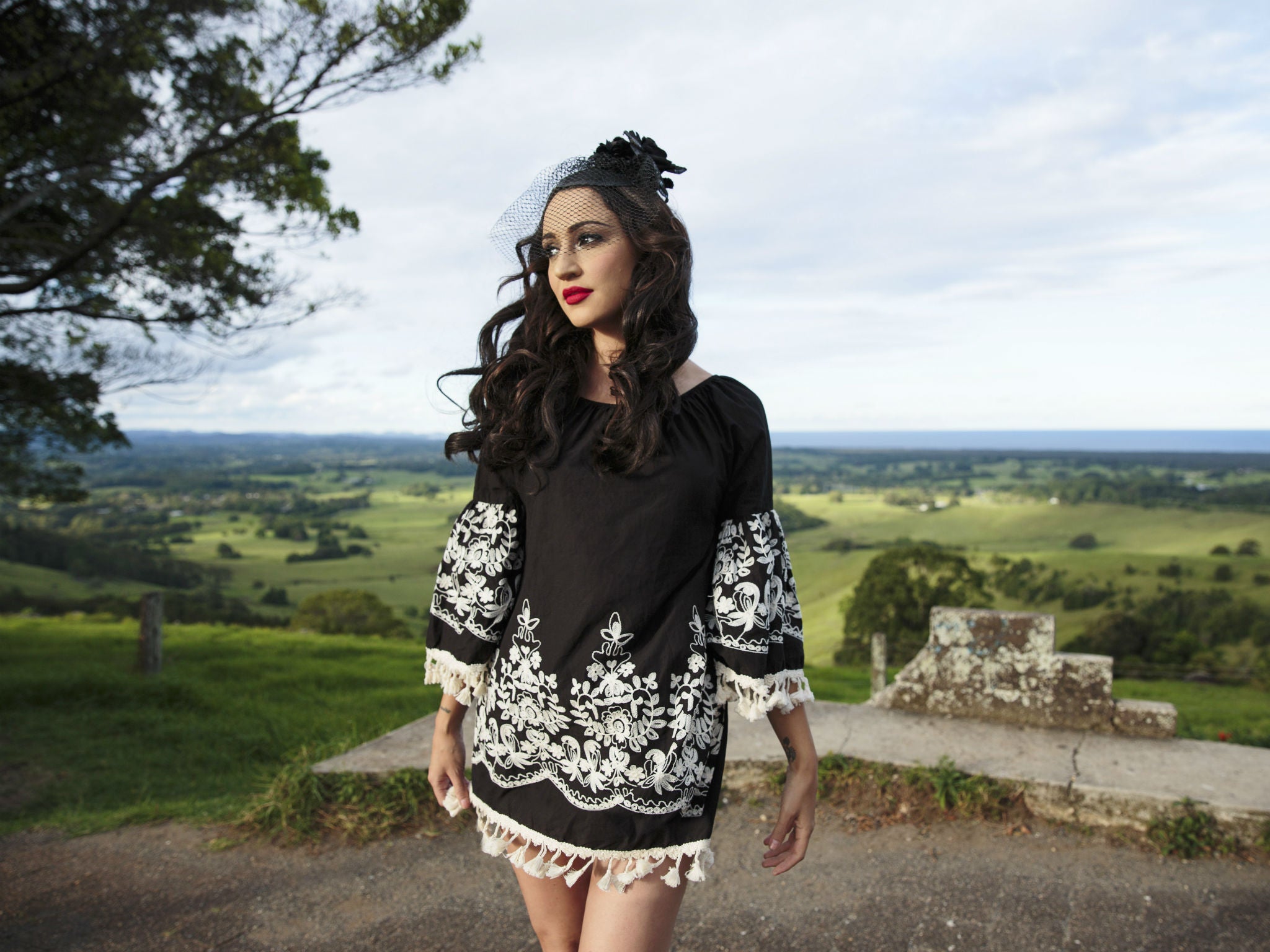Lindi Ortega: The goth-country star on suffering Body Dysmorphic Disorder, and wanting to help fans 'feel less alone'
After documenting her struggles with her mental health and body image, new record 'Liberty' finds the singer in a happier place

“In high school I really did think I was a hideous creature,” maintains alt-country singer Lindi Ortega. “I had a hard time understanding how I really looked. I didn’t know how to take a compliment, I thought when people were complimenting me they felt sorry for me.”
The candid Canadian musician is talking about Body Dysmorphic Disorder (BDD), which she has experienced from her pre-teens, ever since she was mercilessly bullied (”the whole school turned against me”) at her Toronto school.
We talk on the day when the country music singer’s bold, searingly honest, and eloquently written essay on BDD has been published on Lena Dunham’s Lenny Letter website.
In it, Ortega admits that “my self-image grew so distorted that I actually convinced myself I was deformed… throughout my teens, I constantly obsessed over how unattractive I was,” adding “the faulty wiring in my brain had me convinced that, without makeup, I was monstrous – a fragmented Picasso painting on acid”.

Her parents – her father is of Mexican descent, her mother Irish – were exasperated and worried by her behaviour. Her mum told her that she was wasting the best – most precious – years of her life by devoting so much energy on my appearance.
“When I was 15 or 16 I would spend four or five hours getting ready to go out anywhere, to make myself look the way I wanted,” Ortega emphasises. “It was a frustrating time for me and I would end up crying on the bathroom floor and cancelling my plans. I felt so alone in it and back then the internet didn’t exist and I couldn’t type it in and find out what was wrong with me.”
BDD continued to effect Ortega throughout her 20s and as her music profile blossomed she became increasingly anxious about photoshoots and videos and all the trappings of the music industry, including how she looked on stage.
The 38-year-old is a sensational live performer with a persuasive blend of haunting, pristine falsetto vocals (she sounds like giddy mix of Emmylou Harris, Patsy Cline and Loretta Lynn), tangy heartbreak lyrics and a sharp wit. But she often dons a country-goth look that incorporates a black birdcage veil and huge black shades, which acts as a sort of “protection” against the world.
However, of late, things have steadily improved. Her Lenny Letter essay has had a cathartic effect. She’s also quite recently got married, to a part-time musician and housebuilder, and they’re trying for a baby.
Enjoy unlimited access to 100 million ad-free songs and podcasts with Amazon Music
Sign up now for a 30-day free trial. Terms apply.
ADVERTISEMENT. If you sign up to this service we will earn commission. This revenue helps to fund journalism across The Independent.
Enjoy unlimited access to 100 million ad-free songs and podcasts with Amazon Music
Sign up now for a 30-day free trial. Terms apply.
ADVERTISEMENT. If you sign up to this service we will earn commission. This revenue helps to fund journalism across The Independent.
Plus, she’s moved from her Nashville base back to her native Canada, in Calgary, Alberta (she doesn’t miss the “machine” side of Music City, or having endless conversations about music and the industry). And Ortega maintains that she’s had a huge degree of creative freedom on her new record, Liberty, and has a supportive manager who said she “could do what she wanted”.
Ortega, who adores Johnny Cash and “outlaw” music, certainly appears more upbeat and relaxed than when I interviewed her in a grotty Paddington pub five years ago. She is evidently thrilled by her new “concept” album, which was produced by Nashville’s esteemed Skylar Wilson and which is laced with a wholly intentional spaghetti western/Quentin Tarantino feel. It’s a love that the collaborators share.
“I told Skylar my idea for Liberty was something that might end up on a Tarantino movie soundtrack and his eyes lit up,” says Ortega. The most obvious reference is on the track “The Comeback Kid” on which the singer proclaims “You took my life and wrecked it, but I’ve been resurrected”, which smacks of Uma Thurman’s vengeful Bride in Kill Bill. Ortega acknowledges the comparison.

“A lot of people have said it and the reference totally makes sense,” she admits. “The song was just inspired by wanting everybody to be a comeback kid… you can take the story literally if you wanted to and see it as a revenge ghost story.
“Or it’s like someone who’s been bullied in school or someone who is in a job with a terrible boss. It’s any situation where somebody tries to put you down and they don’t succeed because you persevere; anybody in that situation could be a comeback kid.”
Liberty is her fifth album on a major label (she also released two independently in the early- to mid-2000s) and builds on the critical success of 2011’s Little Red Boots (which includes the perky “Little Lie”, which featured on hit TV series Nashville), 2013’s Cigarettes and Truckstops, and 2013’s Tin Star, which won her the Canadian Country Music Award for Roots Artist of the Year.
However, in true country fashion, there’s been a lot of struggle along the way, with unsatisfying backing singer assignments with the Killers’ Brandon Flowers and a supporting act role with Kevin Costner. Supporting the US punk outfit Social Distortion proved more rewarding, however, as did opening for KD Lang.
But her brand of goth-country hasn’t always be easy to classify or pigeonhole, which she acknowledges: “I have so many different influences that come through my music and that might make it hard for people to market.”
There’s no doubt Ortega’s established now, however, and her generous 15-track Liberty is packed with her trademark songs about darkness and the devil, most notably “Forever Blue” (”I spent most of my days fighting the dark”) and “Darkness Be Gone” (“The Devil’s coming for me now, there’s nowhere I can run”).
Ortega, a champion for the downtrodden, claims that the album was inspired by “talking to her fans after shows”.
“I heard their stories about how some of my songs helped them through dark times in their lives,” she says. “People would open up to me, and I want to give them a whole album that could help them through whatever struggle they’re dealing with.”
However, rather depressingly, dealing with fans can come with its own problems: specifically, the advances of predatory men.
“99 per cent of the time I never have a problem,” she says. “But one time this guy puts his hand up my skirt and grabbed my arse. To be honest, I thought if that situation ever happened to me I would clock that guy in the face, but I was so shocked that I just stood there.
“So I understand the #MeToo movement and I totally understand not knowing how to react when something like that happens. I get it. It happened to me and it wasn’t really that severe, but I couldn’t move, I couldn’t even speak. I understand why people have been quiet about it and are now feeling this strength to come forward. I’m totally behind the movement and I hope justice is served. We’re all uplifting each other.”
As our conversation comes to an end, we return to Ortega’s piece on BDD and how the singer wrote with the intention of making people “feel less alone” – as well as for the child, a daughter perhaps, that she might have in the future.
“I thought maybe if I wrote this piece, somebody who was suffering with something like this might feel less alone,” Ortega maintains. “Sometimes people who suffer from mental illness feel stifled by it, and they can’t follow their dreams. I wanted to say, ‘Look: I was able to do it’. This is a scary thing for someone with BDD: to put themselves on display the way I have and get on stage every night and do photo shoots and video shoots and have people commenting on social media. Sometimes they call you ugly, sometimes they call your something you’re most scared to hear.”
Ortega, it seems, is a goth spirit on the side of the angels. “If I’m able to get through it, maybe someone who is stifled with this thing can get through it too. That was my only hope.”
Liberty’ is released on 25 May and Lindi Ortega tours the UK from 2 June (lindiortega.com); her essay on BDD can be viewed at lennyletter.com
Join our commenting forum
Join thought-provoking conversations, follow other Independent readers and see their replies
Comments
Bookmark popover
Removed from bookmarks